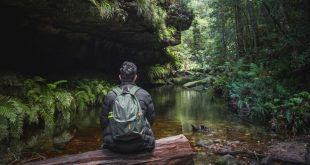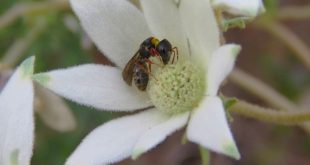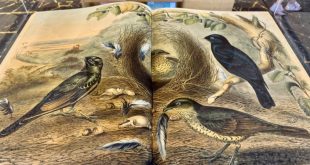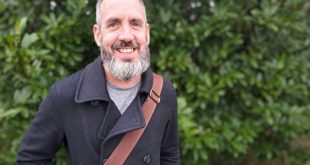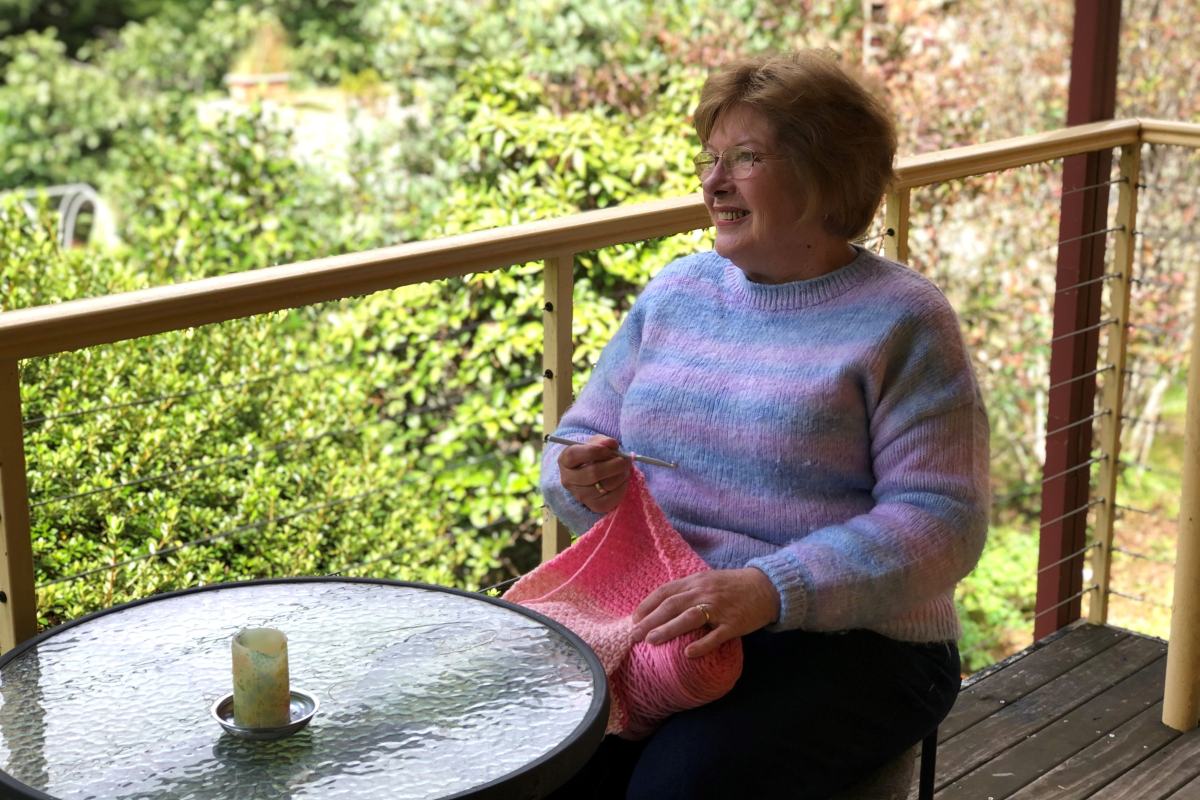
Lynne enjoys her solitude at home. (Photo: Julie Nance)
Story by Julie Nance
The Homes for Older Women (HOW) program is a successful community-based solution to the national housing crisis. Since launching in May last year, the Blue Mountains not-for-profit has secured accommodation for 47 older women facing housing insecurity and homelessness.
Writer Julie Nance helped set up the program as a volunteer and recently finished a challenging but rewarding year as Program Manager. She shares the experiences of women involved with, and impacted by, the grass-roots initiative.
Key Points:
- Research shows older women are now the fastest-growing group to experience homelessness in Australia. 66% of homeless people in the Blue Mountains in 2021-22 were women. This is higher than the national figure.
- Older women are at greater risk of housing insecurity due to factors including relationship separation, death of a partner and retirement. Women often have significantly lower superannuation balances and savings than men.
- The Homes for Older Women program collaborates with local homeowners, volunteers, community organisations, businesses and three levels of government to help combat the housing crisis.
As Lynne sits crocheting on her back deck overlooking the bush, memories of loss and homelessness don’t bite as powerfully as they used to.
The 72-year-old once ran a successful small business in the mid-Mountains and is a proud mother, grandmother and great-grandmother. After Lynne’s partner of 18 years passed away, her life took a series of negative turns.
She was given notice to leave her rental property and struggled to secure accommodation on one income. After couch surfing with family for a few months, she suffered a mini stroke.
“It was traumatic losing my partner – we had a lot of plans,” Lynne says. “I was homeless, unwell and very stressed about the future.”
The HOW program connects women aged 55+ facing housing insecurity and homelessness with compassionate homeowners who have vacant rental accommodation – granny flats, studios, houses, apartments or spare bedrooms. Run by Older Women’s Network (OWN) Blue Mountains, the free service is supported by a dedicated team of volunteers including those fielding calls and emails daily from distraught older women needing help.
Many, like Lynne, have brought up families and had successful careers. A high percentage of home seekers are on aged or disability pensions but some are still working full-time or part-time. They simply can’t afford the ridiculously high rents or compete against rental applicants with double incomes.
It was confronting to face the reality that in our beautiful Blue Mountains community my own peers – women in their 50s and alarmingly as old as 80 – are sleeping in their cars or vans, couch surfing or pet sitting, often for years. Some have escaped domestic violence or are facing mental or physical health challenges, exacerbated by their living conditions.
Despite the stories of hardship and despair, there was a strong undercurrent of resilience and courage. One of the biggest rewards was seeing the transformation in women once they had secured a home.
For Lynne, moving into a two-bedroom, furnished granny flat in the upper Mountains allowed her to regain her independence and enjoy her hobbies again.
“HOW has given me an anchor and the security I need,” Lynne says. “It was the answer to my prayers. My landlord is the best I’ve ever had.”
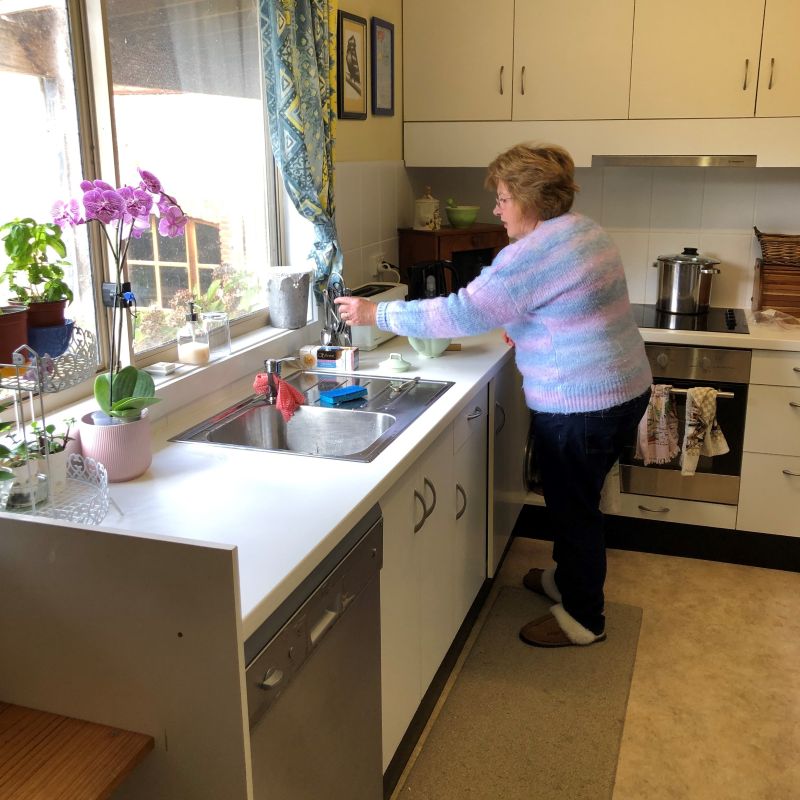
After couch surfing, Lynne enjoys her own kitchen. (Photo: Julie Nance)
The origins of HOW
In early 2023 Bronwen Johnston, a member (now Chair) of OWN Blue Mountains, came up with the idea to utilise existing accommodation to support older women facing housing insecurity. The concept was embraced by the local membership and OWN NSW. Bronwen formed a volunteer team with fellow members Heather Shepherd and Kerry Chater. Vent Thomas, a local IT expert, joined the team and after Kerry left her position, I was invited to come on board.
We worked hard for many months to get ready for launch. In March last year I secured the role of Program Manager, with a Mercy Foundation grant funding two days of my full-time workload. The dedicated volunteer team continued to grow.
I was saddened to spot a handwritten note pinned on a noticeboard outside a lower Mountains supermarket from a 90-year-old seeking accommodation. We knew we wouldn’t be short of vulnerable older women requiring our services, but we had no idea if homeowners would come to the party once we launched our expression of interest process in late May.
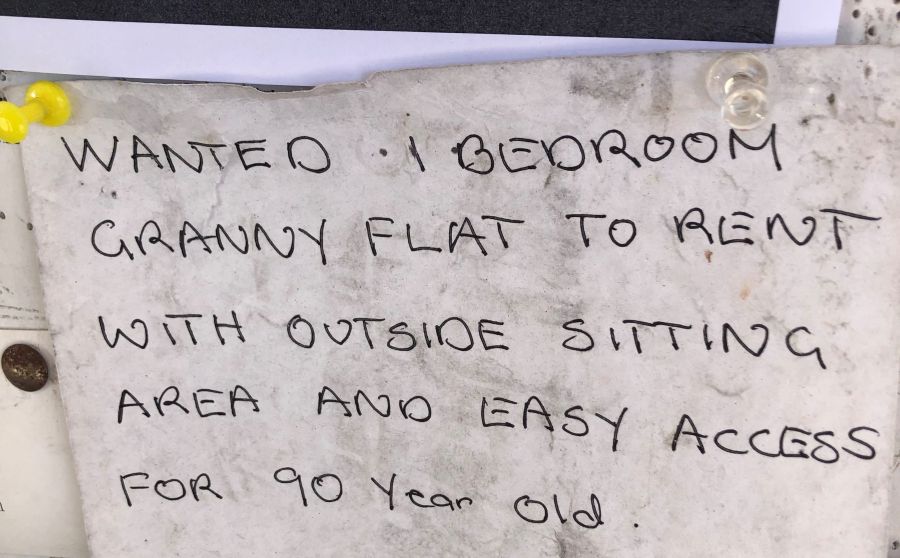
The note that made my heart sink. (Photo: Julie Nance)
We needn’t have worried. The response from the community was swift and overwhelming. Within 10 months the program had housed 47 women in a wide range of accommodation including studios, granny flats and share houses. We even found a property for a tiny home!
HOW has attracted a growing number of supporters in addition to OWN NSW including Scenic World, ActiveCampaign, Catholic Care, Blue Mountains Computers and Bendigo Bank. In December last year Homes NSW (Homelessness Innovation Fund) became a program partner which boosted resources and allowed the employment of part-time Program Officer Michelle.
Fundraising and donations are still required to address the high volume of women needing accommodation and wrap-around support. The number of women on the books often swells to more than 70, with a constant shortage of self-contained accommodation.
HOW volunteer Sandy Croker, a social worker, was one of the first volunteers to come on board, donating one day per week to support intake calls from home seekers and homeowners.
“I love the uniqueness of the program, the women’s stories and how the program reaches out to the community,” Sandy says. “Homelessness affects everybody.”

Former HOW Program Manager Julie (in white) with intake volunteers (L-R) Coralie, Sandy, Carol, Program Officer Michelle and Kathryn. (Photo supplied)
Collaborating with the experts
From its inception, HOW has gained valuable support from an Advisory Committee including representatives from Blue Mountains Health and Resource Centre (BMHRC), Blue Mountains City Council (BMCC), Mountains Community Resource Network (MCRN), Link Wentworth and Zonta Club Blue Mountains.
Kris Newton, MCRN Executive Officer, says HOW demonstrates the strength of place-based, locally-run initiatives that are “agile, flexible and able to act swiftly”. She says they are not tied down by layers of bureaucracy, they know their local ‘patch’ and they are able to harness local community goodwill.
“HOW offers a template for how a community can craft effective local solutions, utilising local knowledge and local partnerships to deal with local issues,” Kris says.
Homeowners participating in the program gain a financial return for renting out accommodation and also have the satisfaction of making a significant difference in the lives of older women.
Wendy Truelove spotted a HOW Facebook post soon after purchasing an investment property in Lithgow. The founder of Red Dot Animal Programs – a rehoming, education and desexing charity – was acutely aware of the challenge of finding pet-friendly rentals.
When HOW put forward a woman with an elderly dog, two cats and a bird, Wendy didn’t hesitate to consider her application and offered her the long-term rental.
“I am often contacted by people facing the heartbreaking decision of surrendering their pets to be able to secure a rental home,” Wendy says. “Renting my property with HOW means an older woman and her animals can stay together.”
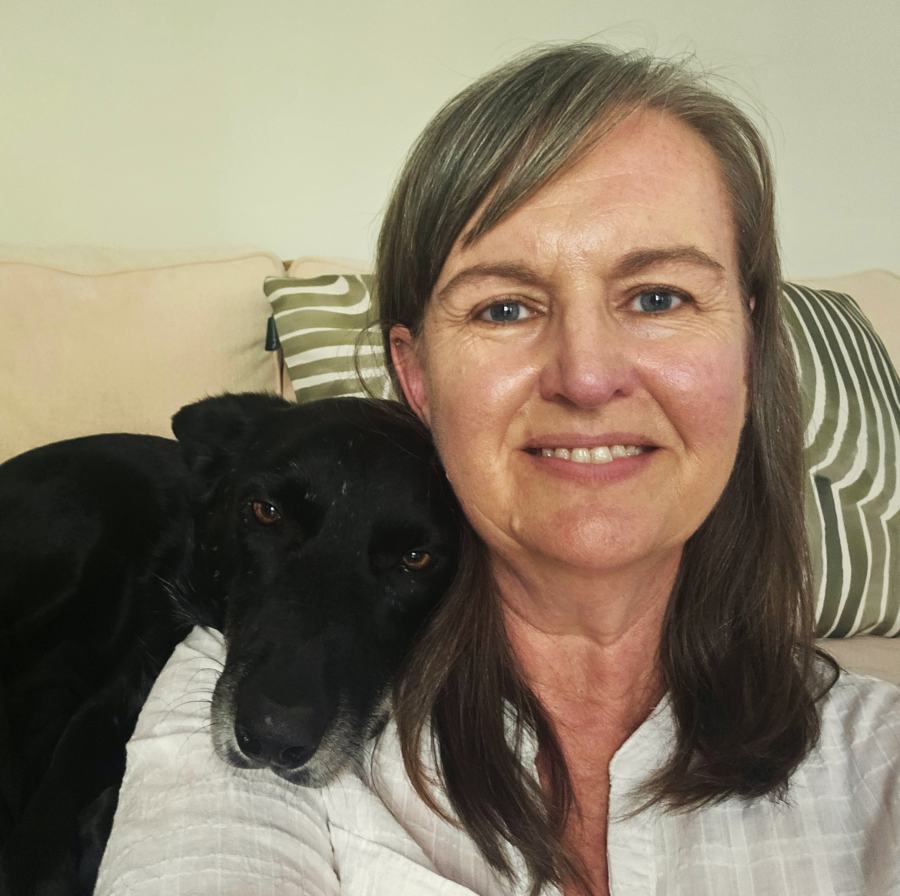
Wendy, a HOW home provider and program supporter. (Photo supplied)
Red Dot has recently come on board as a HOW supporter, providing donations of pet food and other products.
“In a single income household, after paying rent, utilities and groceries there is often little left over,” Wendy says.
Saying goodbye
Late last month (March) I had to walk away from a program I’m passionate about so I could focus on my health. I learned so much from the women we supported and all the wonderful people offering help. This includes the importance of a stable home, connecting to community, self-care and hope.
I received an email before I left which reinforced the importance of HOW:
“I want to thank you and everyone working in this program so much for giving me hope at a very dark time. Having people who listened to me with compassion and understanding meant more than I can tell you, and I hope you know how much what you do matters.”
Take Action:
- If you have a vacant studio, granny flat, home, apartment or spare bedroom, get in touch with new HOW Program Manager Katherine Starr for an obligation-free chat: 0493 965 190; how@ownnsw.org.au; or visit how.ownnsw.org.au
- Follow and like HOW on Facebook
- Spread the word to friends, family and co-workers by sharing this article
- Donate
Share this article:
More from around the region
Our Planetary Health newsletter is now out! Read about the Trainee Administration Position available with the Planetary Health Centre, our upcoming workshops, and the Heroic Communities of the Blue Mountains who are finding housing for older women; creating inclusive and creative alternative media with zines; sharing their faith in the value of compassion, love, kindness, gratitude and joy; and sharing skills for improving physical and mental health and restoring habitat for wildlife, reducing textile waste and growing seeds and edible gardens.
Follow the link here:
https://bit.ly/42l8W9O (link in profile)
#jobs #planetaryhealth #housing #housingforolderwomen #skillshare #bushcare #ediblegardens #heroiccommunities #zines #seedsaving #interfaith
It was gloriously sunny and we had a fabulous day of sharing at the Planetary Health Centre yesterday, from T`ai-chi to workshops on the Frogs of the Blue Mountains, Fashion Upcycling and How to Build a Survival Garden in the Blue Mountains. We finished with a Bushcare session in which we enjoyed the beautiful bushland on the site and removed invasive weeds to expand the habitat for wildlife around our swamp. We were joined by frogs in our pond and the little echidna who returned for a swim! Thank you to everyone who shared so generously. We tasted Yacon and shared rhizomes, Purple Congo Potatoes, Oca, Turmeric, and seeds for Salsify, Egyptian Spinach, Red Mustard, Echinacea, Parsley, Chard, Radish, and Red Noodle Beans. Our next Skillshare Saturday will be on the first Saturday of May. If you`d like to be notified of all our workshops, and the meetings of our Seed Saving and Gardening Groups, subscribe to receive the fortnightly Planetary Health newsletter at any of our Local News sites like www.katoombalocalnews.com (links in profile) #skillshare #planetaryhealth #taichi #qigong #frogs #bluemountains #katoomba #fashionupcycling #upcyclingfashion #survivalgardens #seedsaving #loofah #community
Our Skillshare Saturdays are on the 1st Saturday of every month and we`re looking forward to a beautiful sunny day tomorrow for our first Morning T`ai-chi & Qigong. Fashion Upcycling is booked out this month, but we still have a few places for Frogs of the Blue Mountains, Building a Survival Garden and Planetary Health Bushcare. Bookings via Eventbrite (links in profile). For more information ph. 0407 437 553
#skillshare #planetaryhealth #sunnyday #katoomba #bluemountains #taichi #qigong #frogs #seedsaving #survivalgardens #bushcare
Imagine, if just once a month, everyone gave a few hours back to nature to repair the damage we`ve done. We would so quickly restore the habitat of so many species struggling to survive and provide the habitat for many more to flourish. Once a month, for three hours, our Planetary Health Bushcare group does just that. We`re repairing the damage of human impact and being immediately rewarded by our time in nature and the great company of the other members of our Bushcare Group. We`ll be meeting again this Saturday 5 April at 1.30pm and all are welcome to join us and learn more. Contact Karen Hising at khising@bmcc.nsw.gov.au or call the Bushcare Office on 4780 5623 if you`d like to give it a try.
For more information about the Planetary Health Centre and how you can get involved contact the Planetary Health office on 0407 437 553
#bushcare #biodiversity #wildlife #habitat #regeneration #planetaryhealth #community #allinthistogether #bushcare #katoomba #bluemountains
In our `How to Build a Survival Garden in the Blue Mountains` workshop on Saturday 5 April, we`ll be starting an Upper Mountains Seed Saving group and sharing seeds, tubers, recipes for more unusual foods, and information about the many ways we can create more food system diversity and resilience. Learn about skirret, salsify, collards, cardoons, sea kale, Good King Henry, mangel wurzel, oca, yacon and more. Places are limited so bookings essential here (link in profile) : bit.ly/4kVAUA8
#foodsystems #foodsecurity #fooddiversity #foodresilience #biodiversity #planetaryhealth #healthydiet #plantbased #katoomba #bluemountains
Was that a frog or cricket you heard? Check out our video matching the photos of the 20 frogs of the Blue Mountains Mountains with their calls so you can learn the difference. View our exhibition, learn how to use the FrogID app, and how to build a frog pond and frog hotel, at our workshop this Saturday 5 April at 9am. Bookings via via link in profile. You can view our full video on YouTube (link in profile). Subscribe for more great content. #frogs #bluemountainsfrogs #planetaryhealth #katoomba #frogcalls #exhibition #workshop
A huge thank you to the Blue Mountains Interfaith Group for organising an inspiring afternoon that brought community together and renewed our sense of connection, hope, wonder, shared purpose and commitment to care for our extraordinary planet. We had a full house with the Frogs of the Blue Mountains looking over our shoulders! Next Saturday 5 April we`ll be launching Saturday morning T`ai-chi and Qigong which will continue on the first Saturday of every month. Bookings essential here (link in profile): bit.ly/3Rn9RzY #interfaith #hope #wonder #commitment #connection #community #planetaryhealth #katoomba #bluemountains #taichi #qigong


